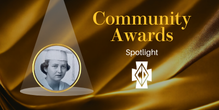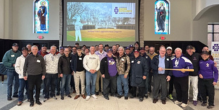Know Your Neighbor
Reprinted from Traditions, Winter 2016-2017
March 8, 2017
 Cretin-Derham Hall Profile: Julie Knopp'06
Cretin-Derham Hall Profile: Julie Knopp'06
“One of the biggest myths amongst young people right now is that cultural experiences are “out there…” and that keeps us from achieving a more pluralistic and collaborative community. Ultimately, we don’t have to cross a city limit or an international border to experience another reality. To become a global citizen, we can start right here at home.”
Whether in El Paso, Texas; Chiang Mai, Thailand; Juarez, Mexico; Kalamazoo, Michigan, or even across the river in Minneapolis, St. Paul native, Julie Knopp ’06 has found one thing to be true all over the world: the power of knowing our neighbor is transformative.
Knopp is the founder and current Director of City Stay, an innovative community-building program designed to spark connections across cross-cultural lines through experiential learning. City Stay is based on the idea of study abroad, but on the local level, providing Minnesotans the chance to live with a Minnesota family of a different culture – often Somali, Hmong or Latino.
“We hope to facilitate connections that will help reduce community mistrust and social inequality in the Twin Cities,” explained Knopp. While the mission of City Stay is not politically-motivated, Knopp believes that many of the issues that challenge our society today come from the need to build a greater understanding between cultures in an increasingly diverse world.
She reflectively points out that there are a billion Muslims in the world. “How can you understand them, if you have never even met one?”
CDH Fosters a Foundational Sense of ‘Neighbor’
The seeds of Knopp’s vision for building greater relationships across cultures in our own city started at Cretin-Derham Hall. “I loved the sense of community at CDH. There was so much talent and energy and generosity in one place. I really felt the spirit of the Catholic social justice teachings alive each day at CDH.”
One of her biggest inspirations for City Stay was found in Spectrum, one of two unique senior class options that integrate English, Religion and experiential servicelearning. (Spectrum also integrates Social Studies.) For her year-long service, Knopp worked at the Peace House Community, described in her words as ‘a sort of spiritual oasis for the homeless.’
At the beginning of her service, she was admittedly leery of the obvious differences between her and the others at the Peace House…and the directive to ‘just go mingle.’ As the weeks turned into months, she noticed a growing sense of trust between her and those she met. “As a 17-year old, I grew to understand that we could become friends if we tried to have a meaningful conversation.”
She was also challenged by her teachers to think about each person’s role in the world. Often, students and teachers would engage in intentional, but difficult conversations on tough topics such as race and economic realities. The teachers would model how to come to terms with personal assumptions, bias and experiences that might be complicating or enlightening an individual’s outlook.
Knopp believes these conversations, which integrated personal experience, critical thinking, Catholic Social Teachings, and an interdisciplinary view of the world, define the CDH experience.
“My teachers cultivated a desire to know my neighbor,” said Knopp. That has been a driving force in her work around the world, and now back in Minnesota, ever since.
She attributes much of her philosophy about her role as a global citizen to these critical high school years. “At CDH, faculty and staff modeled caring in every moment of every day – caring about the poor, caring about the sick, caring about the lonely, caring about each individual student.”
“In a world filled with apathy and bitterness, the hope alive at CDH was a huge motivation to me,” said Knopp. “ I’ve rarely come across people who have such a sense of possibility, who believe so genuinely that large-scale change can happen, and that individuals matter in making that change.”
Global Experiences Hit Home
She then attended Kalamazoo College and graduated with a degree in Human Development and Social Relations. While there, she studied in Chiang Mai, Thailand as well as one semester on the border of Ciudad Juarez, Mexico and El Paso, Texas.
To her surprise, she found El Paso (Texas) to be a more transformative experience than Thailand. “In El Paso, a predominantly Mexican community, I was shocked to find a totally different face of my own country. I expected Thailand to feel totally foreign, but I didn’t expect to feel that way in El Paso. I was often struck by the irony of feeling like a foreigner (in my own country).”
Those experiences, in addition to her rich experiences in high school, proved to be a profound challenge to her ideas about what it means to be an American. “I started to wonder what untapped potential we have, right in our backyards, for cross-cultural learning and dialogue.”
A New Concept in Cultural Exchange
After returning to the Twin Cities for her teacher licensure, she started to develop the concept for City Stay.
From the beginning, her leadership team of four, including a fellow Raider, Sean Hershey ’06, met resistance. “We were told we were too young, without enough business skills, and that the cultural divide would not work for short term stays,” reflected Knopp. The challenge of this “new idea” was real but they persevered.
After launching a pilot program in 2009, they were able to secure funding from private donations, church and community grants as well as tuition fees. Today, they run three cohorts plus additional workshops and other opportunities per year, primarily for high school students.
The programs offered through City Stay aim to bridge these cultural divides by putting high school, college, or even professional adults in a program that include a homestay and an immersion into a culture other than their own, right in their own city.
Often a program includes a one-week homestay, but there are shorter options. City Stay organizes tours and site visits to places such as ethnic markets in order to meet a broad swath of the community.
“We believe that City Stay breaks down barriers and sparks unlikely connections between the diverse cultural communities of the Twin Cities – with the aim of reducing stereotypes…so we can see diversity as an asset, not an obstacle.”
Promoting Connections for CDH Students
In addition, she offers cultural competency workshops for professionals hosted at University of St. Thomas and Macalester. Knopp also visits the Spectrum and Seminar classes at CDH every year, and has worked with CDH students who are interested in the City Stay experience.
Tim Spika, a Senior Seminar teacher for the past ten years, believes current CDH students really benefit from Knopp’s input on the Seminar “Dear Neighbor Project.” She sets up opportunities for students to create a personal encounter with the ‘dear neighbor,’ whether in the local Hmong, Latino, and Somali communities or even day visits with families. She also suggests ways to authentically experience and explore the diversity in Minneapolis on the Lake Street Walk project.
“Julie is making a difference in the metro area by connecting diverse groups and promoting understanding and common ground,” explained Spika. “In a divided country and world, such connections are important.”
This article and more are featured in the Winter 2016-2017 issue of the CDH Magazine, Traditions.
Subscribe to our e-Newsletters
You might also like:
Community Awards Spotlight: Nancy Parlin, PhD '52
Each month, we will highlight one or two Community Award recipients—alumni and friends from Cretin, Derham Hall, and CDH—recognized for their outstanding achievements and contributions.
Taste of CDH Serves Up Food, Fun, and Community Spirit
The Taste of CDH brought together over 300 guests, 26 generous vendors, and the CDH community for an evening of delicious food, joyful connection, and spirited support for student tuition assistance.
Dennis Denning Day Honors a Coaching Legacy
More than 80 alumni gathered at Shrode Field on May 2 to celebrate the life and legacy of legendary coach Dennis Denning, whose impact on CDH baseball continues to inspire generations.




